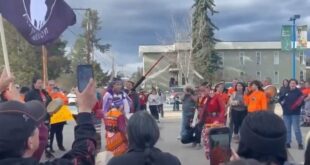A Siksika Nation councillor says the study reflects community members' experiences

Systemic racism and inequity in health care may be contributing to why First Nations patients in Alberta disproportionately leave emergency departments without being seen, or against medical advice, according to a new study published in the Canadian Medical Association Journal.
The peer-reviewed paper builds on a previous one that found nearly seven per cent of First Nations patients' visits to emergency departments ended in them leaving without care, compared to nearly four per cent of visits by non-First Nations patients.
The team examined provincial administrative data for more than 11 million emergency department visits in Alberta from 2012 to 2017, controlling for patients' ages, geography, visit reasons and facility types.
"First Nations people, when we control for all of these other factors, have higher odds of leaving without completing care," said Patrick McLane, an adjunct associate professor in the University of Alberta's department of emergency medicine. He co-authored the study.
The researchers also asked 64 health directors, emergency-care providers and First Nations patients to comment on their quantitative findings through sharing circles, a focus group and telephone interviews from 2019 to 2022.
McLane co-led the study with Lea Bill, the executive director of the Alberta First Nations Information Governance Centre. Elders and First Nations partner organizations helped shape the study and interpret its results.
Racism and stereotypes
Study participants, while commenting on the quantitative findings, raised a number of reasons why First Nations patients leave emergency departments without receiving care.
They shared stories of providers discriminating against First Nations patients and relying on stereotypes about them.
One participant, who was quoted in the study, reported walking out of one health care facility and visiting another after a doctor's first question was how much alcohol they had had to drink.
Another participant mentioned overhearing a racist rant at a nurses' station in an emergency department.
Participants also noted other barriers to receiving care, such as long wait times, transportation availability and health-care professionals using medical jargon while speaking with patients.
Siksika Nation Coun. Samuel Crowfoot said the study reflects what members of his community southeast of Calgary have long been experiencing: misdiagnoses, being targeted by hospital security, and physicians assuming intoxication.
The First Nation has encouraged members to share stories related to racism and discrimination in health care and signed an agreement with Alberta physicians to address both problems.
Benedict Crow Chief, of Siksika Nation, filed a human rights complaint last year against Alberta Health Services (AHS) and a hospital, alleging anti-Indigenous discrimination led to the death of his wife, Myra Crow Chief.
At the time, AHS said it could not comment on the specific case but that racism and discrimination have no place within the organization.
In a Friday statement, AHS spokesperson Kerry Williamson said the agency acknowledges that some Indigenous people face barriers accessing care because they do not feel safe or welcome within the healthcare system.
"This has to change," he said.
AHS continues to implement a roadmap to improve care for all Indigenous peoples in Alberta and expand its Indigenous Wellness Core (IWC), which works with Indigenous communities and partners to provide culturally appropriate health care for Indigenous people in Alberta.
"By creating meaningful relationships and listening to Indigenous communities, we will continue to build partnerships that improve the health and wellness of Indigenous patients and families together," Williamson said.
Crowfoot said the problem goes beyond Alberta, though. He hopes other First Nations file complaints on behalf of members who experience discrimination.
"It's very frustrating because these stories are common and we'll bring them forward as many times as we need to until we see significant change," he said.
Interrupted care
The study's authors said their findings show disproportionate disruptions to care for First Nations patients.
The team found a greater proportion of First Nations patients came back to the emergency department within 72 hours of leaving. About one in 20 patients, in First Nations and non-First Nations groups alike, needed to be hospitalized upon returning.
The findings align with Australian research that found more Indigenous patients chose to leave emergency departments before being seen.
In a previous study, McLane and his colleagues found First Nations patients in emergency departments tended to receive a lower level of care than other patients.
Strategies to retain patients
The Alberta study's authors suggested providers and emergency departments work with First Nations on strategies to retain First Nations patients.
Dr. James Makokis, a family physician from Saddle Lake Cree Nation, said emergency care providers should be following basic triage principles, taking patients' vital signs and taking extra steps to communicate and check in with Indigenous patients.
Around-the-clock transportation, he said, could help people who live on First Nations that may be several hundred kilometres away from a hospital.
Improving access to primary care could also reduce the pressure on overburdened emergency room staff, he said.
Crowfoot and Makokis said complaint processes should be streamlined so patients have an easier time reporting racism and discrimination when it happens.
"Until we're actually ready to address those things in a real, fundamental, truthful, transformative way, we will still continue to see results like this," Makokis said.
ABOUT THE AUTHOR
Reporter
Madeleine Cummings is a reporter with CBC Edmonton. She covers local news for CBC Edmonton's web, radio and TV platforms. You can reach her at madeleine.cummings@cbc.ca.
With files from Tashauna Reid
*****
Credit belongs to : www.cbc.ca
 MaharlikaNews | Canada Leading Online Filipino Newspaper Portal The No. 1 most engaged information website for Filipino – Canadian in Canada. MaharlikaNews.com received almost a quarter a million visitors in 2020.
MaharlikaNews | Canada Leading Online Filipino Newspaper Portal The No. 1 most engaged information website for Filipino – Canadian in Canada. MaharlikaNews.com received almost a quarter a million visitors in 2020.







